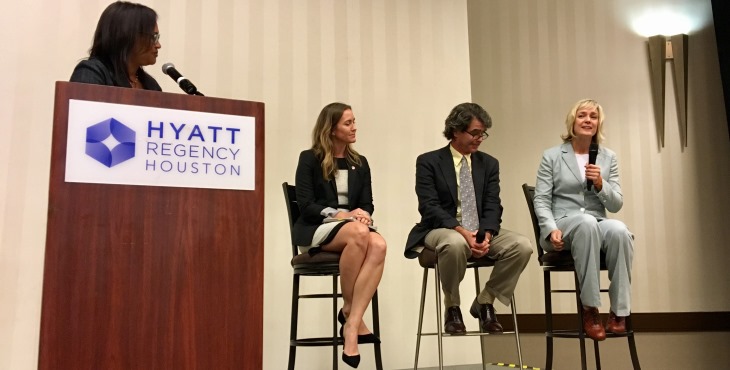As Hurricane Harvey was coming up the Gulf Coast and threatening the 2017 National Women Veterans Summit, 20 women Veterans gathered in small groups to discuss their experiences with transition from military to civilian life and their knowledge and perceptions of VA benefits, particularly health care. From their stories, we learned that many were unaware of the health care benefits VA offers. They stated all Veterans need help moving from military to VA health care and suggested the Transition Assistance Program (TAP) would benefit from a session specifically dedicated to VA women’s health services.
Besides transition recommendations, the women Veterans discussed challenges with VA health care. They shared difficulties being recognized as Veterans and encountering assumptions they were spouses or dependents. Even when their Veteran status was acknowledged, participants discussed having experienced capacity issues at VHA—not enough female doctors, no women-only support groups and a lack of resources appropriate for women such as women’s sizes in walking casts etc. One participant described her experience this way:
“I go to the VA for my mental health and it took me years to do that because the first time I went, I went through the usual, ‘Are you here because your husband’s a Veteran?’ ‘No, I’m a Veteran.’ So once we finally got past all that then I’m talking to somebody who is not a Veteran, who doesn’t understand what I’m talking about, doesn’t understand the language, has NO CLUE what I’ve been through and then they say, ‘Well, maybe you’ll be better with a group.’ ‘Ok.’ And [then] I’m the only woman in the group.”
Listening to women Veterans’ experiences was the first step toward designing and implementing tailored solutions. Using what we’ve learned in these focus groups, VHA is piloting an improved Transition Assistance Program for women in partnership with the Air Force at five bases in 2018. In this pilot program, transitioning women will receive a one-day session to discuss in detail the physical and mental health services available to them after they transition. The addition to the program is designed to take some confusion out of the process of enrolling in VA health care. If successful, it will be rolled out to other branches and sites as well.
“What I know about VA health care is that it works for a lot of people , but it requires us opening up,” said another focus group participant. “It hurts to relive things but we need to educate providers so they understand our story, at least they hear our story. They can hear the pain and they know they can develop a plan based on your true stories, our true stories.”
The focus group feedback provided a valuable supplement to the survey VHA conducted on barriers women Veterans face to engaging with VHA services. In addition to the enhanced Transition Assistance Program, VA is also working to address other identified concerns by improving the environment of care, hiring and training additional Designated Women’s Health Providers, and finding other ways to engage women Veterans in VHA care.
We are grateful to these focus group participants and we will continue to seek more opportunities for women Veterans to discuss their experiences so we can develop and enhance women-centered programming in both the Transition Assistance Program and the VA health care system. To learn more about VA services and resources for women Veterans, call the Women Veterans Call Center at 855-VA-WOMEN.
Topics in this story
More Stories
Black Lab Raisin reminds Veterans of life outside the hospital, brightens their lives with her endless capacity for joy.
VA remains open for business and is closely monitoring the Change Healthcare (CHC) cybersecurity incident.
Take the stress out of travel. My HealtheVet makes preparing for your time away easy with these five quick tips.







My name gerald strong jr
I am writing this to help my family out. When my dad was in the Navy back in 1963-1967 my dad was a Vietnam veteran when he came home he would cut himself serval times infront of his childrens, gerald strong jr, Stephen E Strong and barbara strong now barbara ford.We never got help for truma we saw as children, never got help thur veteran affairs or are government, we all suffer from PTSD. my dad was paroid skits frankin.yall can call me (redacted),we also from agent orange.
I would like the head veterans affairs to call me at (redacted),we have alot to talk about……
Mr. Strong,
I sent you some information on VA mental health care services as well as local contact information to the email address you provided.
Good Morning .I am Veteran presently being served at the Coatesville Va Medical center. the problem that I am currently being face with is refusal into a program being offered here for homeless disable veterans. The program is called CWT I have had this program four years ago. The issues is the program manager has a personal thing about me and she will not allow me in the program ,her reason being I have been in it before and you are only allowed three times in the program. Is there time limit in Compensated Work Therapy program within the Va?
I was recently seen at VAMC La Jolla in a specialty clinic. The civilian MD who appeared to be a minimum of 75 walked into patient room, looked at me, a 59 y/o woman veteran who served 24 yrs, with a scowl, and barked “What War Were YOU in?” clearly implying that only those who served directly in combat should be “veterans” worthy of care. I guess he forgot that women were not allowed to serve in combat roles for many years. I looked right back at him and said “I was a flight surgeon and a psychiatrist during the Gulf War and the operations following thru 2004.” He made a face and said “I served in Vietnam”!
Those of us who served in “supporting” roles provided vital services to those in direct combat. I have service connected disability, and I, and others, should not have to defend our miltary service to a VA physician.
The VA needs to get rid of any providers with that attitude towards women veterans.
Each individual article I would like to pass on via Facebook or email is not set up to do so. I don’t want the VA site, just the article I am interested in.